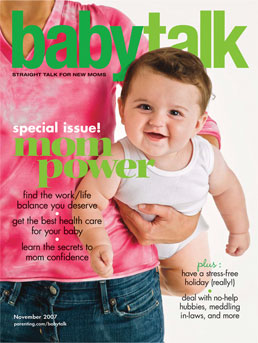 Holy crap. A few weeks ago, a group of educated, well-paid, professional women sat in a conference room at the Bonnier Corporation in midtown Manhattan and decided that, in matters of basic science, medicine, and health, they would treat moms like scared, clueless, little children. Then they published the following article about an unambiguously titled study from Pediatrics: the Official Journal of the American Academy of Pediatrics, "Baby Care Products: Possible Sources of Infant Phthalate Exposure":
Holy crap. A few weeks ago, a group of educated, well-paid, professional women sat in a conference room at the Bonnier Corporation in midtown Manhattan and decided that, in matters of basic science, medicine, and health, they would treat moms like scared, clueless, little children. Then they published the following article about an unambiguously titled study from Pediatrics: the Official Journal of the American Academy of Pediatrics, "Baby Care Products: Possible Sources of Infant Phthalate Exposure":
Once again, another scare-your-pants-off study has hit the news: Phthalates -- manmade chemicals that have been linked to adult reproductive issues, particularly in boys -- are turning up in baby pee-pee. Worse, researchers think they're coming from those sweet-smelling bath-time toiletries you lather on. But let us be the first to tell you to stop sweating it. For starters, the levels of phthalates found in the babies' urine have not yet been proven harmful (more research needs to be done). And the toiletry products parents used on their kids in the study were not tested themselves, so experts can't be totally sure that's where they came from. Seattle pediatrician and lead researcher on the study, Sheela Sathyanarayana, M.D., says all moms need do to avoid this scenario is use a little less of whatever you love, or switch to fragrance-free products. Because phthalates are used to stabilize fragrances, no scent often means there's no need for them.Never mind that they're technically right: parents don't need to be scared out of their pants over phthalates in toiletries; they can simply stop using "whatever [they] love"--because babies don't need it in the first place. Or that phthalate-free and fragrance-free are not the same thing, or that the only reason lotion and powder are cited in the study is because the test subjects reported using them.
They're using freakin'--what else can I call it?--babytalk to diss a plainly written study from the freakin' AAP at the same time they're angling to be treated as the go-to experts ["let us be the first to tell you"]. And then they wrap up their advertiser-mitigated, incomplete advice with a pitch for more product: ["A few of our favorite brands:"]
You don't see any problem with this? Then polish up your resume, Babytalk's looking for an Executive Editor. The paysie waysie starts at $120,000/year.
Chemicals in Baby Bath Products? [parenting.com via dt reader debbie]
Baby Care Products: Possible Sources of Infant Phthalate Exposure [pediatrics.aappublications.org]
Posted: 5/9/2008, Executive Editor: Babytalk Magazine. Company: Bonnier Corporation [careerbuilder.com]



I actually got dumber reading that. Peepee? really? Am I 4?
How hard is it to avoid phthalates? Super easy, just stop smearing toxic shit on your kid's head.
babytalk has always been an organ for the industry, publishing endless drivel, misleading "advice", and puff pieces. Nice to know it hasn't changed a bit.
[the editor was just made head of the whole group, and editor-in-chief of Parenting. I guess drivel is a growth industry. -ed.]
I have limited experience with magazines like this -- mostly from reading in the ob's office -- but as a new dad I'd like to know where the intelligent reporting is for parents. Any recommendations?
[you're here. there's not anything in a magazine you can't find sooner and easier and more thoughtfully discussed than on the web. of course, there's also piles of crazy bullshit, too, so watch your step. -ed.]
Victor, there's Mothering Magazine (the latest issue has an editorial regarding the name of the magazine and how it relates to its male readers). It's the only parenting magazine out there that doesn't make me feel anxious that I'm not scheduling and buying enough stuff for my kid. It is decidedly hippie, though, so don't read it if you have violent reactions to things like extended nursing and people who don't vaccinate. I don't always agree with everything, but at least it's thoughtful writing.